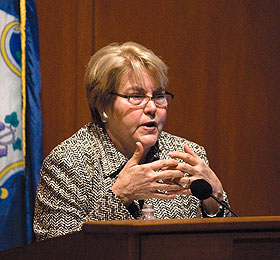  |
| HOME | THIS ISSUE | CALENDAR | GRANTS | BACK ISSUES | < BACK | NEXT > |
Human rights speaker brings discussion close to home by Sherry Fisher - October 27, 2008 |
||||
| As the 60th anniversary of the Universal Declaration of Human Rights approaches, Americans should think about how to celebrate human rights in the United States, says Charlotte Bunch, founder and executive director of the Center for Women’s Global Leadership at Rutgers University. Bunch gave the 15th Raymond and Beverly Sackler Distinguished Lecture in Human Rights on Oct. 20 at Konover Auditorium in the Thomas J. Dodd Research Center. Her talk was titled, “Passionate Politics: The Intersection of Gender, Culture, and Human Rights.” Bunch said the Universal Declaration of Human Rights, adopted by the United Nations General Assembly in 1948, is “an amazing document, because it puts forward what I think is the aspirational aspect of human rights. Human rights is a struggle for relationships of individuals to each other and individuals to the state.” She said now is the time to look at the Declaration’s principles and ask, “What does this mean in the United States today? How can we begin to interpret our own relationship to rights, not just as something somewhere else in the world?” She adds, “We think of human rights primarily in terms of government’s accountability, but rights are also about our accountability to one another.” She said she was disappointed that the question of human rights wasn’t raised more often in the presidential debates. “It’s a critical discussion,” she said. “I recall only one moment when Obama and McCain were asked if health care was a right or a responsibility. I think that was a reflection of an important discussion going on in this country that I hope we will see as part of a worldwide discussion, about how we understand human rights to be not only in the civil and political sphere but also as a matter of social and economic well being, and the importance of everyday rights in everyday life, in the home and family. I believe that that’s what women’s human rights has sought to personify.” Bunch said 20 years ago violence against women wasn’t considered a human rights issue.
“If you went to an Amnesty International meeting or a Human Rights Watch meeting, you would be told that violence against women was not a human rights issue,” she said. But today the situation is different. “Women started to think about what violated their human dignity, taking principles of human rights and saying that something that so fundamentally corrodes and debases our dignity must be understood in relation to human rights,” Bunch said. That led to a body of works that women have contributed to from around the world, defining rape, domestic violence, and torture. Today, the United Nations Committee Against Torture recognizes that there can be extreme forms of domestic violence that constitute torture. Bunch said that indigenous peoples have sought to interpret their human rights and how their traditional understanding of rights relates to human rights declarations. For example, a group of indigenous women from several different countries wrote a companion report to the UN Secretary General’s Report on Violence, Bunch said. They looked both at violence within the community by men toward indigenous women and violence against indigenous women as indigenous people in the community. “This is the kind of work that’s happening all over the world,” she said, “where people take human rights principles and connect the issues of race, gender, and class and come up with new interpretations of how human rights are viewed.” |
| ADVANCE HOME |

